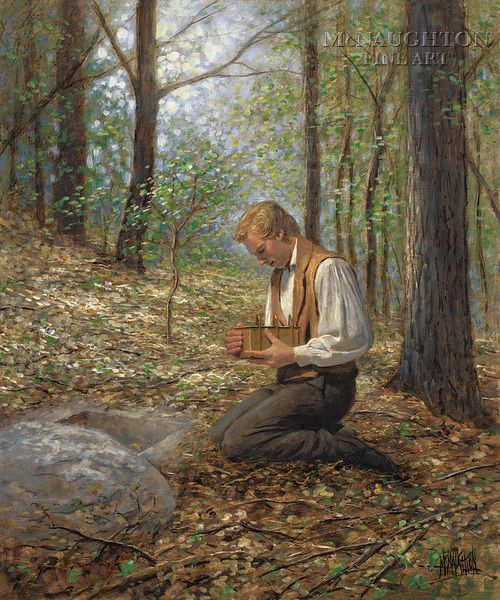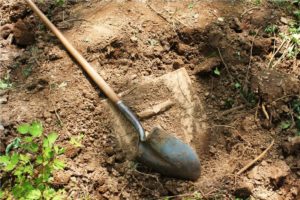A parable about the Book of Mormon and why it’s worth digging into
May I share with you the Parable of the Buried Treasure? In this story a rich gentleman wanted to help a poor widow pay off her mortgage. But he didn’t want to reveal his identity. So, he sent an anonymous letter telling her he had buried $200,000 in a nearby forest. The money was hers simply for digging it up. He included a map showing exactly where to look.
Knowing that she might be skeptical, he had prominent local residents send her letters assuring her the offer was genuine. They included the town mayor, the chief of police, and a prominent local merchant. They all said they knew the unnamed benefactor and had even been present when he had buried the money. A forest ranger called on the widow to tell her there was evidence of fresh excavation in the forest. In fact, he had found a shovel at the scene with fingerprints of a rich though unnamed local citizen.
Another man told the widow that he had passed a metal detector over the site. Amazingly, the needle registered at the far end of the scale. Finally, the bank sent a letter certifying that a rich depositor had withdrawn $200,000 just the week before.
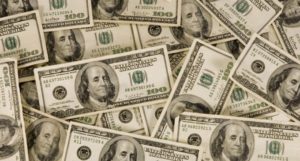
At this point our parable might take several different turns. The widow could say that she had never trusted politicians, so the testimony of the mayor was inconclusive. She might be uneasy because the chief of police and the businessman were related, so possibly were in collusion. She might say she didn’t understand electronics, so the evidence from the metal detector didn’t mean a thing to her. Or she could hesitate on grounds that all the letters could be forgeries. Perhaps someone could be trying to make her look foolish. Unless she had absolute proof that there really was money buried in the woods, she would not go looking for it.
If she gave any of those responses, we might question her sanity. Certainly, we would stop feeling sorry for her. Even though the story of the treasure sounds unbelievable, there would be one very simple way to check it out. She would need only go and dig in the designated site and see whether in fact there was any money there. The test would not take long, and the potential rewards would be more than enough to warrant the risk.
The Book of Mormon
So it is with an even more valuable buried treasure which the Lord has offered us—the Book of Mormon. The story of its origin through angelic visitations to a boy prophet in upstate New York admittedly sounds fantastic. We are not used to the idea of spiritual records coming from golden plates buried in a hillside. But we have even more witnesses that it is so than did the widow in our parable. We have not only the word of Joseph Smith, but multiple additional witnesses. Eleven others testified they saw the plates. Three of them solemnly affirmed they saw an angel of God show the plates to them. They swore they heard the voice of God bear witness that the record was true. This testimony they bore at great personal sacrifice throughout their lives. Some did so even when they later found themselves at odds with Joseph Smith personally.
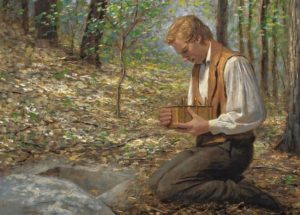
Furthermore, much additional evidence for the Book of Mormon has come forth, some of it only in comparatively recent years. We are now aware of complex Hebrew literary forms in the Book of Mormon, which no one even noticed in 1830. There are many proper names in the book. Some of them seemed at first to be alien to the culture from which the Book of Mormon claims to have come. But scholars have since found them to be genuine Hebrew or Egyptian names from the 6th century B.C. We have computer analyses of the writing styles of the alleged Book of Mormon writers. It is statistically demonstrable that each writer has a different writing style. None matches that of Joseph Smith, Sidney Rigdon, Solomon Spaulding, or any other known figure of the 19th century.
Since 1830, researchers have found numerous metal plates, some with writing on them. Some of them, in fact, were hidden away in stone boxes.
The geography described in the early part of the book matches beautifully what we now know of the Arabian Peninsula. But it is completely different from what everyone believed in 1830. We similarly find that later geographical details match nicely with specific locations and topography in Mesoamerica.
Since Joseph Smith’s time we have become aware of Indian traditions which parallel the Book of Mormon narrative. So does the historical setting of the ancient world. For example, nearly obscure details in the Book of Mormon concerning Jewish rituals and patterns of government fit perfectly with what we would expect from a group of transplanted Israelites.
As impressive as this all may be, however, none of it is central to the ultimate question of whether or not the Book of Mormon is true. The widow of our parable could have resolved all her reservations concerning the reliability of the evidence for buried treasure. She only needed to go to the forest as directed, dig in the designated spot, and see what she found.
So we can answer once and for all the question of the divinity of the Book of Mormon by digging into it. The book itself promises that all who read it with real intent, with a sincere heart, and who pray with faith, will know by a powerful and undeniable inner feeling that the book is true. (See Moroni 10:3-5.) No one has ever followed that recipe completely without becoming convinced that the Book of Mormon is all it claims to be. Readers who love the Bible will find the same spirit in the Book of Mormon. Those who love Christ will find His divinity attested in the Book of Mormon in a new and powerful way. Those who love goodness will find much in the book to nourish their souls and move them to spiritual ecstasy. There is little to risk and much potentially to gain from the experiment.
What would we have thought of our widow if she had found the money, but declined to take it? Perhaps the pollen in the area was causing her hay fever to act up. Or maybe the treasure chest was too heavy to carry to the bank? Few would be impressed with such excuses. Likewise, it will take some work to dig the treasure out of the Book of Mormon. It’s not all on the surface or all to be found in the first few pages. But it’s more than worth the effort.
Once one has found for himself that the promise of the Book of Mormon is true, the implications are enormous. Since it came through Joseph Smith, if the Book of Mormon is true, Joseph Smith must then be a prophet of God. The Church of Jesus Christ of Latter-day Saints and the associated authority of the priesthood and other doctrines which came through him must also be divine. We may each continue to have questions about the Church and ultimate truth for which we do not at present have complete answers. But with a testimony of the Book of Mormon, we can be untroubled by those other questions. We can be confident that the same God who inspired the Book of Mormon writers still leads His Church today and can lead and bless us individually.
My Personal Testimony
I am grateful to have personally had the experience with the Book of Mormon mentioned above, not once but on repeated occasions. It did not come to me initially in exactly the way that Moroni suggests it can. I first came to know the Doctrine and Covenants was true, before I ever had the same feeling about the Book of Mormon. As a competitive teenager, I responded to a challenge in my seminary class. We could win points for our team by reading any of the four books the Church accepts as scripture. The Bible was obviously too long. I had tried reading the Book of Mormon years earlier as a twelve year old, but had concluded it was boring. But the Pearl of Great Price was too short to even feel like a challenge. So, I picked the Doctrine and Covenants by default and have never been the same. Before I had read many pages, there came over me a powerful conviction that the book was true, and that it was the most exciting thing I had ever read.
When I finished it, I was disappointed there was no more. But I decided to give the Book of Mormon another try. I found that they had changed that book a lot since I had first tried to read it! (Of course, they had not, but where I had previously thought it dull, I now found it exhilarating!) The same wonderful feeling I had experienced with the Doctrine and Covenants came over me in rich measure as I immersed myself in the Book of Mormon. I have since had the same feelings of joy and conviction as I have read the Old and New Testaments and the Pearl of Great Price. But I enjoy none of them more than the Book of Mormon. I have come to know what Joseph Smith meant when he said that the Book of Mormon is “the most correct of any book on earth, and the keystone of our religion, and a man would get nearer to God by abiding by its precepts, than by any other book.” (Book of Mormon, Introduction.)
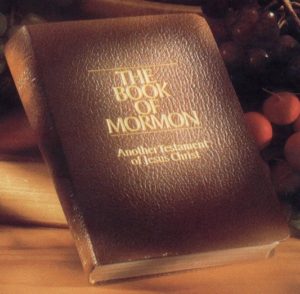
In our congregations we repeatedly sing We Thank Thee 0 God for a Prophet. Let us remember that both President Thomas S. Monson and President Russell M. Nelson have recently emphasized the importance of reading the Book of Mormon and the blessings that will come to us and our families if we will make that book the center of our study. Though through the years I have read the Book of Mormon dozens of times, I continue to find excitement and spiritual nourishment by reading from it daily. I invite all my friends to have the same great experience.
